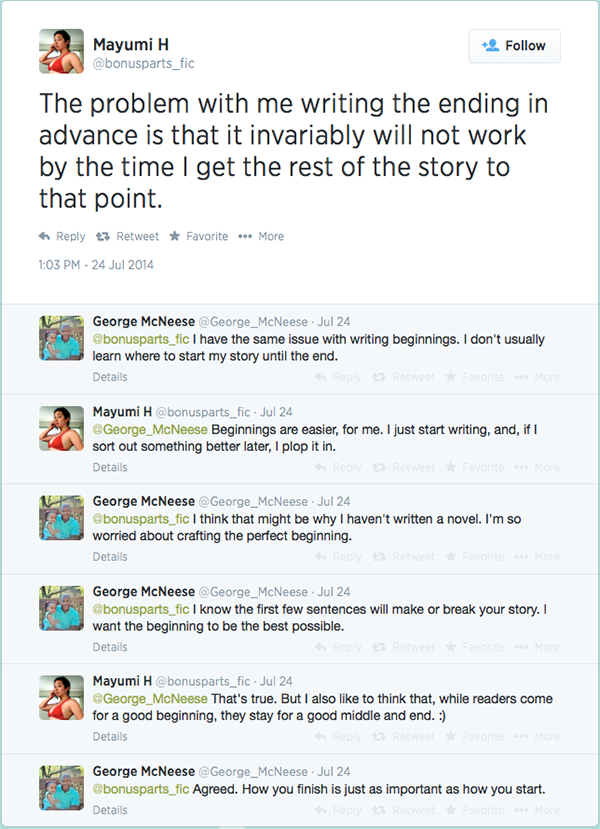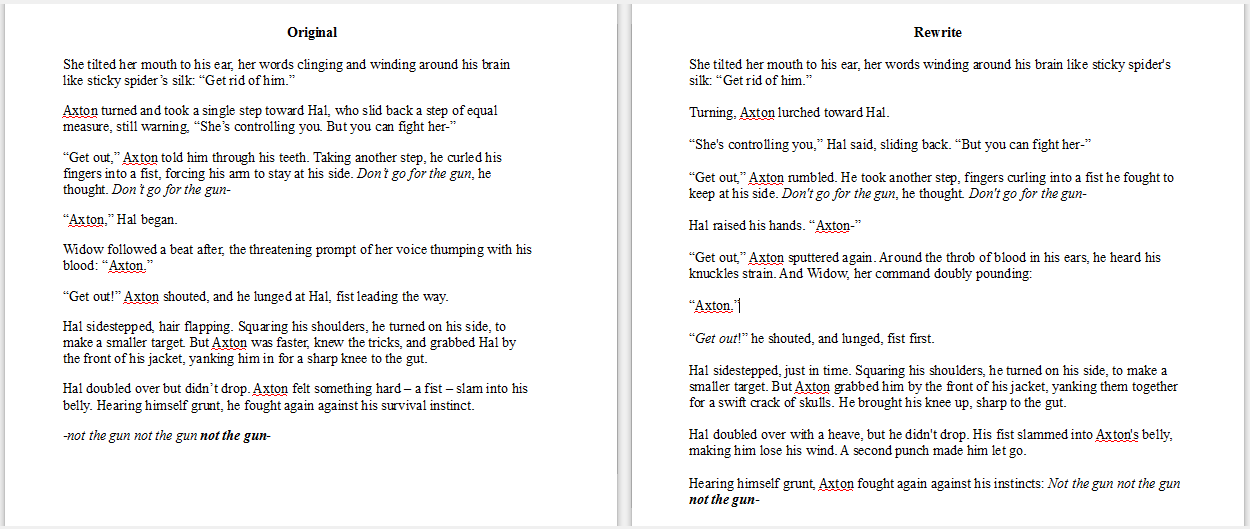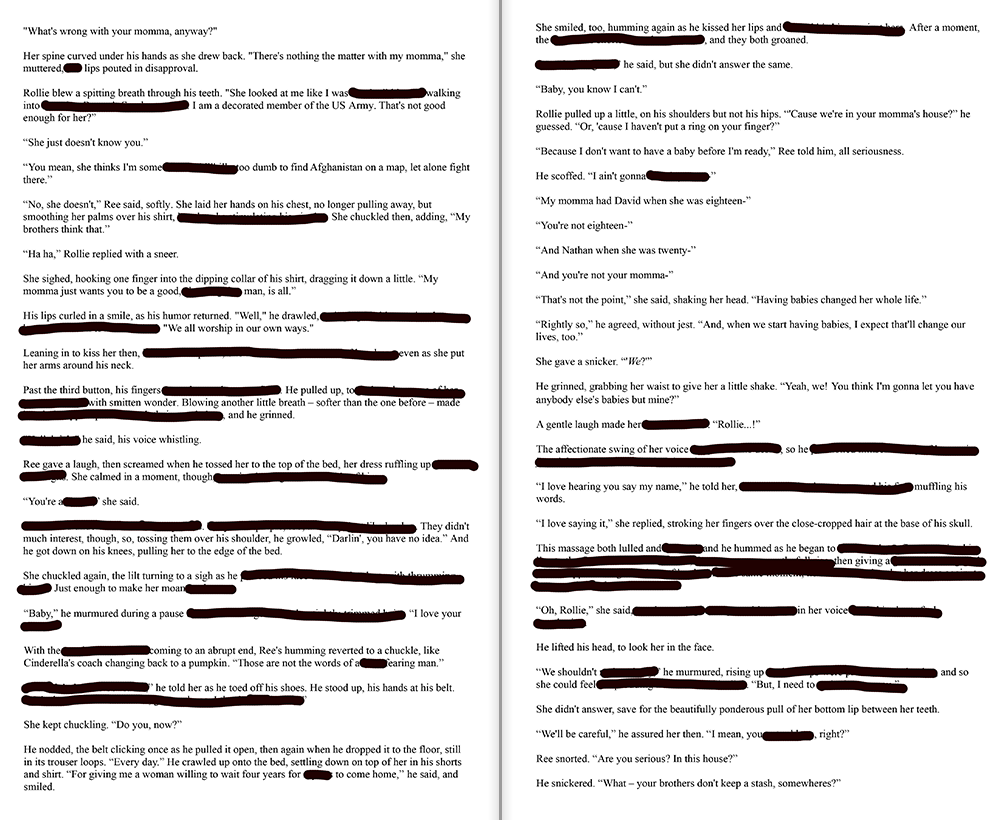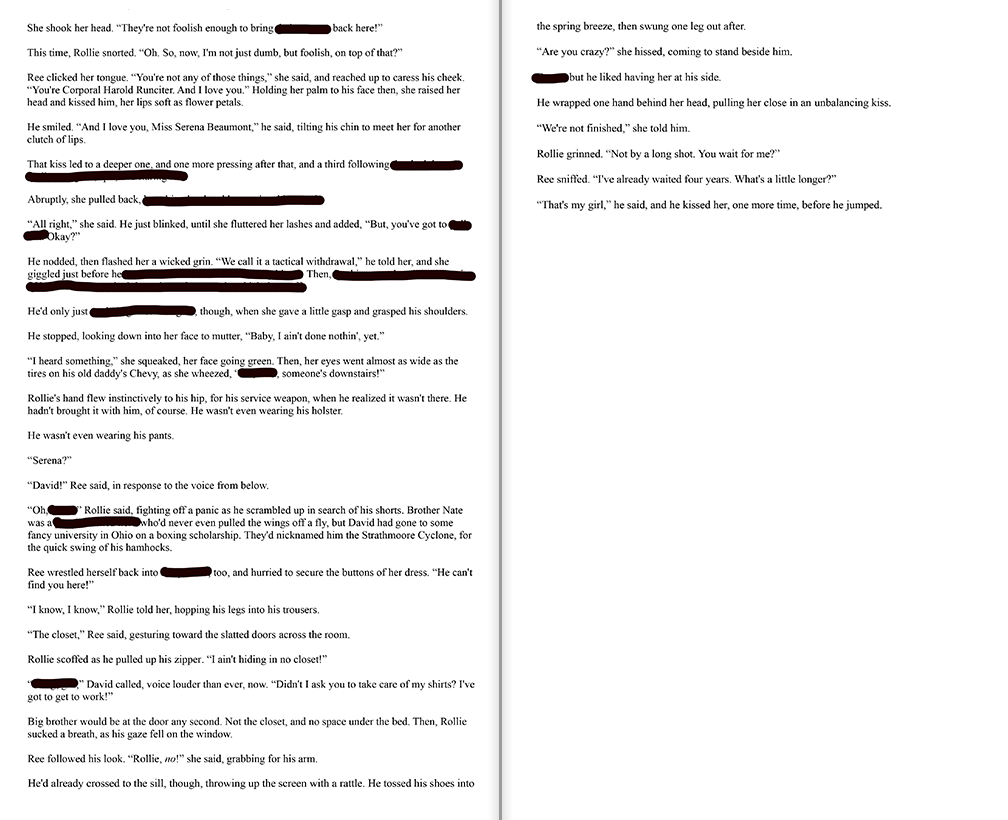by Mayumi-H | Aug 9, 2014 | Fearless, Finding Mister Wright, From Hell (A Love Story), Process
I got a question about my writing the other day:
Do you picture your characters in your head, do you hear their voices? Do they flesh out the more you entertain them and actually write about them? … Do you even start out with distinct picture of a character/situation that grabs your attention?
Generally speaking, I do have voices for all my characters. They often don’t change, either. And, it helps for me to speak out a conversation when it’s still in the plotting stages as well as after it goes down on paper. If something doesn’t sound natural to me, I spend a lot of time reworking it. Unless it’s plot exposition, though I still prefer that to have a spontaneous rhythm to it. 🙂
My sister has an uncanny audio memory. She’ll hear something once and remember it for years. Even inflections! I’m not that good, but I do think that reworking fiction conversations in my head over and over until they become second nature has helped my character voices a lot. One thing a few recent readers have commented on is that my dialogue flows really well, so I’m proud of that.
Characters become more real for me the more I work with them. I think that probably happens with all writers, though. And, it makes sense. We spend so much time in the heads and hearts of these people, we come to know them better than we know the physical people around us. Likely because we are privy to all the inside thoughts and turmoils. Personally, I project a lot into my characters, though I try to keep some of them to specific boundaries, because they all have different conflicts. (It’s hard to articulate.)
My inspiration often can be traced back to a single face/moment/voice, and, as time goes on, characters develop into their own people. For instance, Daniel (“Finding Mister Wright”) evolved from Hal (“From Hell”) by way of Aral (“Anywhere but Here”), who was a different side of Ross (“Fearless”). But, they share similarities in look, manners, and voice, which unites them in my head, and allows me to jump into their shoes with much more ease than I might be able to do otherwise. Fresh characters, as it were, take much more time for me to grasp. One thing that my husband mentioned to me when he read “Finding Mister Wright” was that the first two acts work really well, but the third needed more time with one of the late-intro’d characters. As it stands, she feels like a plot device, not a person, as the other characters do. I see his point, and I think it’s because when she was originally written, she was still one of those “new” characters. Of course, since then, I’ve written more with her, so, now, it’s a matter of going back and growing her into a person as fully-fleshed as the others.
Do you hear your characters’ voices in your head?
by Mayumi-H | Jul 26, 2014 | Process
No deep thoughts this week. I’m working hard on the ending of my sci-fi western, so I’ll offer this recent conversation with Twitter buddy George McNeese:

(click to enlarge)
George is one of my favorite Twitter users because he always has thoughtful things to say, often about his own writing journey. That usually leads me to think more deeply about my journey, too, even when I’m in a tough place, as I am right now, re-crafting the ending of my current story. Especially when I’m in a tough place.
I write sequentially, which I enjoy doing because the story feels like it has more natural rises and dips that way. It also pre-empts issues like my current one, where the ending I wrote a year ago – the initial impetus for the story entire – doesn’t fit with the story that’s been built to come before it. It’s not the worst place to be, of course: the characters have grown a lot from that initial writing, too far into themselves to make that ending work. I think that’s a good thing. But it also means creating an almost entirely new ending moment that has the same emotional resonance as the one I first wrote 400 days or so ago.
A story needs to be strong on all counts: beginning, middle, and end. Finding that right (write?) balance for us is the tricky bit. What’s your favorite part of the story to write?
by Mayumi-H | Dec 7, 2013 | Process, Short Stories
Earlier this week, LimebirdVanessa over at Limebird Writers posted the 25th edition of their Writing Competitions and Opportunities Digest. The series in itself is full of great opportunities for writers of all genres, interests, and skill levels, but one of them stood out in particular: the Confettifall Christmas Contest. Head on over to the Limebird Writers post to get the full details (and more!).
You back? Okay.
As you’ve read, the Confettifall Christmas Contest is to create a 140-character story. Confettifall’s site says there is no particular theme for this contest, so we could write whatever we wanted, with a few caveats (no profanity, no pornography, and no poems this time around). Ordinarily, these guidelines alone would hamper my ability to tell a story, but with only 140 characters to do the deed, I couldn’t waste my character count on foul words or play. I’m wordy enough as it is!
I wanted to have a very simple theme – romance/revenge – and a moment from my past struck me. On a lark, I’d gone to a palm reader with some friends of mine. We each had our pasts/futures read, with varying degrees of accuracy. The experience was mostly just a five-dollar jaunt into something silly we’d never done before, a fun way to pass the time while we waited for the guys in our party to show up. But, one line from my fortune teller stuck with me that night, and has continued to stay with me for many years. You’ll see what I mean….
Below is the process I took for this particular challenge. It’s pretty standard to my normal challenge process, though I’ve put in some of my internal monologue, just to keep things interesting:
Goal: Write a story in 140 characters.
First try:
The tarot reader had been spectacularly wrong on most counts: she had no children, no white picket fence, no important job. Certainly, the loving, faithful husband bit was a joke. But, the old woman had said one thing that had resonated with young Cecilia: “That which you cannot create, you are destined to destroy.”
Jace, her “loving” and “faithful” husband, never saw the shot coming.
Character count: 386. Okay, that’s way too long, but I’ve got an idea going. Now, to start whittling.
Second try:
While wrong on most counts, the psychic had made one correct prediction: What Cecilia couldn’t have, she’d destroy. Shame Jace didn’t hear it, too, or he’d have known about the gun.
Character count: 181. Not bad, but it doesn’t punch. And, 41 characters too many.
Third try:
What Cecilia couldn’t have, she would destroy. That had been her tarot reading.
Jace had called it cryptic nonsense. Maybe if he’d listened, she wouldn’t have shot him.
Character count: 167. I like this one better. It’s closer, but STILL too many characters. Need to whittle it down by 27.
Fourth try:
“What you can’t have, you will destroy,” the psychic said.
Her husband called such advice money-grabbing malarkey.
Maybe. She still shot him, though.
Character count: 147. I’m drifting into slightly more black comedy territory, here. Maybe not a bad idea.
Fifth try (Starting to wear thin):
“She told me, what I can’t have, I’ll destroy.”
“Bull,” her husband said, swinging his wandering eyes back to her.
“Really?” she said, and shot him.
Character count: 146. I’m starting to hate this contest. And my writing.
Sixth try:
“The psychic said, what I can’t have, I’ll destroy.”
“Bull,” her husband said, swinging his roving gaze her way.
Maybe. She still shot him.
Character count: 140 (tested in a Twitter window). Huzzah! Perhaps this isn’t prize-winning material, but I’ll leave this one where it stands. While fun in terms of a contest challenge, it’s not quite worth it to spend any extra time on.
The whole exercise took me about an hour, from first initial draft idea to what I came up with at the end. Even though this is an “official” contest with a prize and everything, I decided I wouldn’t spend more than an hour on it, just so it wouldn’t distract me all day from the rest of my writing projects. But, it was still fun.
What do you think? What sort of process do you go through for prompts/challenges like this? On a less writer-y note, have you ever had your fortune told?
by Mayumi-H | Oct 19, 2013 | From Hell (A Love Story), Process
A few weeks ago, I put up on the blog an excerpt of a fight scene I was having trouble with. Based on your feedback, I made some changes to the text, ones I hope create a smoother experience for the reader. Do they or don’t they? I’ll let you be the judge. (Clicking the image below will let you read both the original and updated versions, the latter of which I posted for readers just this past week, coincidentally enough.)

I like to think the update works better within the confines of the chapter…but I’m never sure. Because working from feedback has always been difficult, for me.
I like getting critique, especially if it can help my story become better: tighter, clearer, more effective. But, I spent a large part of my early writing life aping others. My sister first, then my favorite published authors. To this day, when I read books while I’m in the middle of writing a story, I find myself incorporating others’ techniques and quirks. It’s been said imitation is the sincerest form of flattery. Though, when does imitation go too far, and we lose our own voice to the art?
I like my voice. It varies from story to story (admittedly, less successfully when I drag out a story for too long), but I like thinking of my stories as my own. When I get critiqued – especially when it’s good critique – I always hesitate. “If I change this phrase to x, will I sound more like A? If I edit that section to y, is my voice becoming like B?”
Even though I may not be destined for publishing, I still want my story to be the best it can be. So, in some cases, writing like favorite author A or insightful reader B might be better. But, does that make a story less mine, less me? I don’t know.
In the face of solid critique, how do you remember to keep to your own voice?
by Mayumi-H | May 22, 2013 | Persona 4 Fan Fiction, Process, Short Stories
A few weeks ago, I wrote about a particular Free Write Friday picture prompt (Free Write Fridays from Kellie Elmore). What came from that free write session was about 1600 words of a relationship story, one that flowed so naturally from my fingers, I just couldn’t stop writing it. As I mentioned in that earlier post, what struck me as I wrote those characters was how much of a role their religion played in their dialogue. Their sexuality also featured prominently, which is one of the main reasons why I didn’t post the piece at the time. Because you never know who you might offend.
Generally speaking, offending potential readers is not something I care very much about. It’s my belief an artist should create Art that speaks from the soul, no matter how dark, bright, raunchy, or chaste. Whether the artist can then sell that creation if they so choose is an entirely different debate. But, the Art at its core should be honest. Otherwise, it’s not so much art or even craft, but simply a consumable.
Side note: I’m not saying there’s anything inherently wrong with producing for consumption. Nor am I saying consumables necessarily exclude artistry, or vice versa. I think A Song of Ice and Fire has proven that pretty well. Besides, every one needs to eat, no matter how high-falutin’ their principles.
That said, I recently revisited that piece of free writing because I was curious to look at it with fresh eyes. I wanted to see if it really was as bad as I’d originally thought. Holding a marker, I went over and redacted everything I thought anyone could possibly find offensive in any way. This is what came of that exercise:


If, for some reason, you’re interested in the actual words, click the images for a more legible experience (they’ll open in a new window or tab). The scene itself isn’t important, though. The reason for this exercise – aside from fueling my own personal amusement – was for me to see just how much black there’d be on those pages.
I’m not particularly smart, so I can’t write good mysteries or thrillers. I’ve only ever held a gun once, and never in a conflict, so I’m not qualified to write a big war epic. But, I understand people, and the everyday conflicts that can arise from personality and heritage clashes. I know love, too, because I experience it in my life every day. And I like sex, because…well, who doesn’t?
I don’t pull many punches when it comes to my stories. I try my best to warn folks ahead of time if a story contains questionable or mature material, but I also believe any individual should be able to decide for themselves if they want to continue or not. But, I’m writing these for me, first, and those topics are the ones I personally enjoy exploring. If they need to be redacted later, to fit someone else’s idea of what’s appropriate or salable, well, that’s life.
Have you ever redacted or edited something you’d written to fit someone else’s sensitivities? Why did you do it? Or, if you didn’t do it, why not?





Recent Comments
The Real Person!
Author Mayumi-H acts as a real person and passed all tests against spambots. Anti-Spam by CleanTalk.
The Real Person!
Author Mayumi-H acts as a real person and passed all tests against spambots. Anti-Spam by CleanTalk.